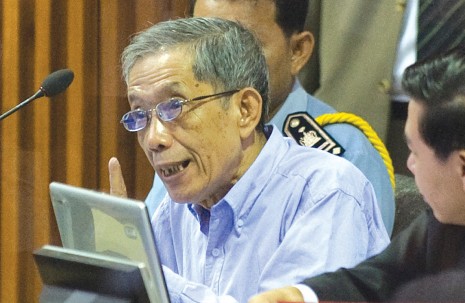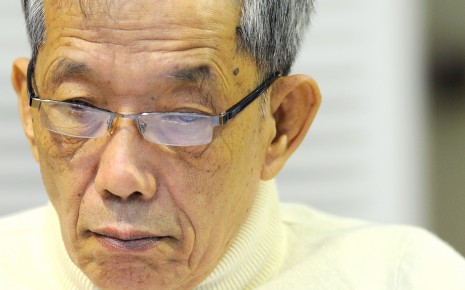Former S-21 prison commandant Kaing Guek Eav, alias Duch, requested a psychologist to assist him with the “severe emotional distress” that might arise from standing trial in 2009, a newly declassified document from the Khmer Rouge tribunal reveals.

The request, released Tuesday, is one of 1,749 documents from the Duch case that are being declassified by order of the Supreme Court Chamber now that all of Duch’s appeal avenues have been exhausted.
“The defense wishes to call the attention of the Trial Chamber to the fact that Kaing Guek Eav could suffer severe emotional distress, which, if he were not to receive proper psychological care, could result in severe psychological problems or even require adjournment of the trial,” read the March 2009 request, originally classified as strictly confidential.
The request was denied by trial judges in July of that year after an initial assessment revealed Duch to be psychologically “resilient and strong,” according to another confidential document.
Among the other documents released this week was a detailed summary of the day in February 2008 when investigating judges took Duch to revisit the Choeung Ek killing fields. Four of Duch’s former subordinates and numerous court officials were included in the visit, but media and the public were barred from the event.
At the time, tribunal spokesmen and Duch’s lawyers told the press that Duch had knelt and wept in front of a tree that had been used to smash the skulls of babies.
Duch’s French lawyer, Francois Roux, later used his client’s tears as a linchpin for his defense strategy, which focused on Duch’s reportedly profound remorse for his crimes, although both Co-Investigating Judge You Bunleng and then-Prosecutor Robert Petit denied having seen Duch cry at the mass grave.
However, a now declassified official court document describing the events at Choeung Ek does not mention that Duch cried or even knelt at all. Of the tree trunk where babies had been smashed, Duch’s only comments are clinical.
“The charged person stated that the children who were arrested were killed at Choeung Ek or S-21. He added that he was not aware of tree trunks being used to kill children and that he personally never gave any orders to this effect, but [he] found the proposition plausible,” the report states.
The newly released documents also include 11 in-depth interviews with Duch conducted by co-investigating judges in 2007 and 2008, as well as other interviews with the suspect before the ECCC even began operations, when Duch was still being detained by the Military Court.
In one of those interviews, conducted in 1999, Duch said he had reported to his superiors, Son Sen and Nuon Chea, his concerns that the confessions he was obtaining under torture were not always true.
“I also complained to Nuon Chea about the confessions that kept spreading out of control, everywhere, every time. Nuon Chea convinced me not to worry and said…Comrade, just strive to do whatever is necessary to get their responses,” Duch recounted.
In another interview in 2002, Duch explained how he was able to survive the Khmer Rouge regime.
“I wish to add that I lived up to 1979 because of three things: First, I did not insist on the arrest of anyone and did not insist that any response was true or not true. Second, I never kept any war booty at all. Third, sexual morality with females.”
In April 2008, during an interview with judges and prosecutors, former Senior Assistant Prosecutor Alex Bates pressed Duch for information on Sou Met, the Khmer Rouge air force commander who would later become one of two suspects named as alleged war criminals in the politically controversial Case 003.
At the time of the interview, prosecutors would have been preparing their initial allegations against Sou Met and his co-accused, Meas Muth, which were forwarded to investigating judges in 2009.
Duch said that he had never communicated with Sou Met directly, but did so “via Angkar,” or the party center.
“You declared this morning that you had no direct relations with Sou Met and that the letters he sent to you were in reality routed through Son Sen, who concealed his intervention,” Mr. Bates said later that day. “I would like you to examine six supplementary documents, in view of which this version does not seem plausible.”
The six documents are communiqués from Sou Met to Duch in 1977 regarding prisoners Sou Met wanted to transfer from his unit to S-21. They are all addressed “to Comrade Brother Duch” and signed “Met.” The prisoners singled out include young men who had previously studied abroad, a man accused of “undisciplined activities,” and 27 unnamed “traitors.”
Sou Met also asked Duch to send him a confession from a man named Mao “in order to search for more enemies.”
The interview containing Duch’s observations on the messages from Sou Met has not yet been released.




